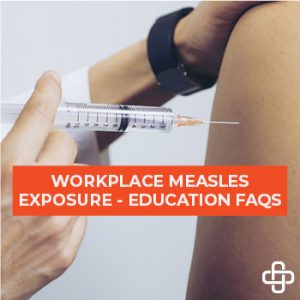 Since January 1, there have been 764 cases of measles reported in 23 states, leaving employers and employees with 2 common questions:
Since January 1, there have been 764 cases of measles reported in 23 states, leaving employers and employees with 2 common questions:
- Am I protected against the measles?
- If I have been exposed to someone who has measles, what should I do?
To answer these questions, we consulted the Centers for Disease Control and Prevention.
Protection Against Measles
The CDC considers you protected from measles if you have written documentation (records) showing at least one of the following:
- You received two doses of measles-containing vaccine, and you are a(n) —
- School-aged child (grades K-12)
- Adult who will be in a setting that poses a high risk for measles transmission, including students at post-high school education institutions, healthcare personnel, and international travelers.
- You received one dose of measles-containing vaccine, and you are a(n) —
- Preschool-aged child
- Adult who will not be in a high-risk setting for measles transmission.
- A laboratory confirmed that you had measles at some point in your life.
- A laboratory confirmed that you are immune to measles.
- You were born before 1957.
For international travelers, CDC considers you protected from measles if you have written documentation (records) showing at least one of the following:
- You received one dose of measles-containing vaccine, and you are an infant aged 6–11 months
- You received two doses of measles-containing vaccine, and you are a person 12 months or older
- A laboratory confirmed that you had measles at some point in your life
- A laboratory confirmed that you are immune to measles
- You were born before 1957
Exposure to Measles
If you have been exposed to someone who has the measles, the CDC recommends:
Immediate notification of your physician to let them know that you have been exposed to someone who has measles. Your physician will be able to:
- Make special arrangements to evaluate you, if needed, without putting other patients and medical office staff at risk, and
- Determine if you are immune to measles based on your vaccination record, age, or laboratory evidence.
If you are not immune to measles, MMR vaccine or a medicine called immune globulin may help reduce your risk of developing measles. Your doctor can advise you, and monitor you for signs and symptoms of measles.
If you are not immune and do not get MMR or immune globulin, you should stay away from settings where there are susceptible people (such as school, hospital, or childcare) until your doctor says it’s okay to return. This will help ensure that you do not spread it to others.

Holly is an ER nurse by trade, but loves content marketing. She was born outside the box and believes everything is better with “sprinkles and sparkles”. She is passionate about impacting lives and uses marketing as her platform for sharing practical solutions to address real life occupational health challenges.
Find out more about our Injury Case Management services or our Occupational Health Programs.










